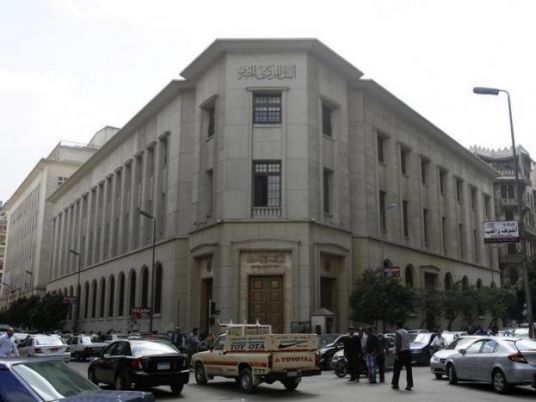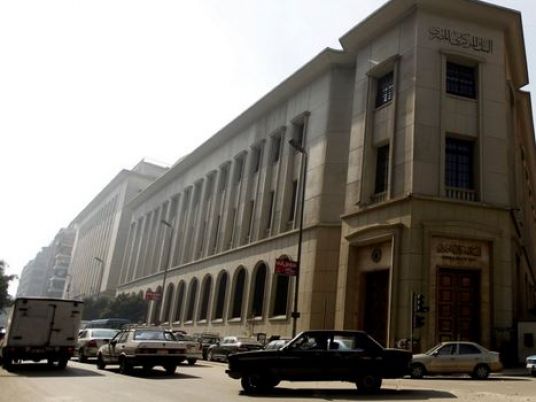The line between exploitation and commemoration is so thin that even Mostafa Mahmoud, owner of the 25 January ‘Caffe’ and Restaurant, is unsure which side of the line his establishment falls on.
Casting a doubtful glance toward the neon-lit sign bearing the name of his restaurant — between an image of a hand making a peace sign and a photo of Tahrir Square at its most crowded — Mahmoud asks, “It isn’t offensive, is it? I don’t see any reason why people would think it was.”
Turning back around, he sighs.
“It wasn’t even my idea; the neighborhood kids chose the name," he said. "I wanted to call it M.M. Café — for Mostafa Mahmoud.”
Located on the Corniche, roughly half way between downtown Cairo and Maadi, the 25 January Café and Restaurant opened in early March, two months later than Mahmoud had originally planned. A small-time businessman and presumably proud owner of M.M. Clothing store, M.M. Mobile Phone Repairs, and M.M. Real Estate Company, he introduced himself by asking if Al-Masry Al-Youm was in need of a “cheap, but comfortable” apartment.
Mahmoud only added the café to his list of establishments in order to give his son Ramy a place to work.
“The boy graduated with a diploma in social services four years ago,” Mahmoud said. “And since then, he hasn’t been able to find a job.”
In mid-January, Mahmoud began converting the entrance of his building, which houses all his other offices and stores, into a café, but work came to a sudden halt with the nationwide eruption of anger that quickly escalated into a revolution.
“My son and his friends went down to Tahrir on the 25th to voice their demands and express their dissatisfaction with the way things were,” Mahmoud explained. “They were only planning on being there for a couple of hours. After what happened, though, they came home, packed some things, and returned to Tahrir to set up camp.”
When his son returned — an event that Mahmoud is “endlessly” thankful for — work resumed on the café at an “impressive" pace.
"Those kids were so enthusiastic, so energized. Even though they’d been living on the street for a month, we were able to finish this place up in a couple of days,” the 55-year-old said, still impressed.
Not content with repainting and decorating the café’s building, the “neighborhood kids”, as Mahmoud refers to Ramy and his friends, also cleaned up the surrounding streets and painted a patriotic mural on the wall of the school directly across from the café.
“I’d repaint the whole school if I could afford to,” Mahmoud grunted. “It’s ugly as hell.”
Halfway through the renovations, Ramy and his friends suggested to Mahmoud that they name the café in honor of the revolution. Mahmoud sort of agreed; most of the signs on display read “25 January Caffe and Restaurant M.M.”
“I don’t think it can really be considered exploitation,” Mahmoud says. “After all, these kids are the 25 January youth, as they’re referred to in the media and such. They are the ones who were out there, and they thought this was an appropriate way to honor something that had brought them — and the rest of the nation, when you think about it — together.”
“They’re not exploiting themselves, are they?” he asks.
The end result may not be impressive in a jaw-dropping kind of way — the furniture is mismatched, surfaces sticky, and a crusty-eyed, scar-faced dog sits in the middle of the place, chewing on what appears to be a bloody goat hoof — but Mahmoud insists it’s a far cry from the area’s original state, and, more importantly, it has brought the neighborhood’s residents even closer together.
“You should come back at night,” he suggested. “Everyone comes and hangs out here. We play dominoes and smoke shisha, and the weather’s beautiful. It’s a really pleasant scene.”
“And if at any point, anybody complains about the name,” he says. “We’ll change it.”
If Mahmoud still displays some signs of doubt over the name settled on for his establishment, others, like Gabr Madkour, don’t seem concerned in the slightest.
In an exceedingly hostile and thankfully brief interview, Madkour staunchly defended his Martyr’s Liver sandwich cart, which is decked out with photographs of the martyrs whose images were most widely circulated among the media following the revolution. He dismissed the suggestion that his choice of name might be in poor taste as “the stupidest thing” he had ever heard.
“What do you want from me?” Madkour — not his real name — demanded. “Do I have to have died in the revolution so I can sell liver sandwiches?”
Situated, at the time of interview, a few meters away from the Helwan metro station, Madkour’s sandwich cart is an aggressively unappealing sight — made even more so by the images of smiling martyrs decorating it. And while it’s possible, if unlikely, that Madkour has deeper connections to the revolution and its fallen that extend beyond his noxious sandwich cart, it’s the presentation that’s clearly the problem.
In the months since the revolution, a multitude of businesses have either adopted or changed their names altogether to “honor” the revolution. Likewise, the faces of martyrs have been printed on everything from buttons and pins to postcards and tissue boxes.
Whether this is due to insensitive attempts at cashing in on a nationally-shared experience, a certain clumsiness resulting from a prolonged restriction of the freedom of expression, or genuine efforts at respectfully commemorating the revolution — the assessment varies, ultimately, according to the individual case.
In the end, it seems the responsibility falls on the public to determine as best they can the well-meaning from the profiteering.




